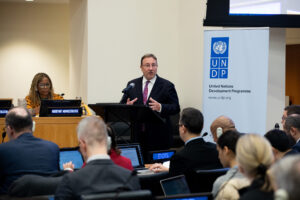London & Partners unveiled nine companies selected for its inaugural Frontier Innovation Fellowship, a programme offering over £500,000 in resources targeting Center for Applied Technology and announced by London Mayor Sadiq Khan during London Tech Week, runs September through December 2025. Selected ventures include quantum gravity sensing (Delta.g), autonomous systems safety (SAIF Autonomy), steel decarbonization AI (Deep.Meta), and electromagnetic defense systems (Holotraps).
Khan positioned the programme as addressing an existential competitive challenge: “London stands at the foot of a once-in-a-generation opportunity to become a leader in frontier innovation. We are on the brink of an explosion of innovation that could redefine our global role.”
The UK secured $16.2 billion in startup funding in 2024—nearly double Germany’s $8.2 billion and exceeding France’s $7.8 billion. The country has produced 181 unicorns, representing nearly one-third of Europe’s total. London’s tech ecosystem alone is valued higher than France and Germany’s ecosystems combined.
However, these metrics measure adoption velocity and commercial scaling, not fundamental research commercialization. The UK excels at fintech iteration, AI application deployment, and SaaS platform development—areas where established technologies get refined for market fit.
The fellowship’s emphasis on “frontier innovation” acknowledges a gap: the UK consumes breakthrough technologies created elsewhere rather than originating them. Quantum sensing, hypersonic threat detection, and steel production optimization represent hard tech requiring years of R&D before commercialization—a profile distinct from traditional UK startup strengths.
Selected Companies Signal Deep Tech Validation
Delta.g raised £4.6 million in September from Serendipity Capital, NSSIF, and SCVC, plus £2.6 million in SBRI government grants. The Birmingham-based quantum gravity sensing company collaborates with University of Birmingham and targets construction, mining, and infrastructure sectors where subsurface mapping creates commercial value.
Deep.Meta secured over £2 million from Innovate UK plus Google for Startups support, applying AI optimization to steel production—an industry responsible for 7% of global CO2 emissions. The company works with steel producers across Europe, US, and North Africa, indicating traction beyond UK pilot projects.
Holotraps received over £2.2 million in grants and private capital for electromagnetic defense systems targeting stealth technology and hypersonic threats. The company engages commercial airports across Europe, suggesting dual-use applications beyond pure defense contracting.
These funding profiles reveal a pattern: deep tech companies accessing government grants before institutional VC rounds. This contrasts with traditional UK tech companies raising venture capital at early stages without non-dilutive funding dependencies.
The programme provides mentorship, workspace, and international exposure through events including Grow Summit and Slush Helsinki. Fellows receive access to global trade missions designed to facilitate expansion beyond UK markets.
Andrew Tibbitts, Director of Innovation and Growth at London & Partners, framed the programme around commercialization: “Frontier innovation is about discoveries and inventions: making scientific breakthroughs and turning them into commercial products and services.”
The international focus acknowledges market size constraints. UK deep tech companies targeting industrial applications, defense systems, or specialized B2B markets cannot achieve venture-scale outcomes serving only domestic customers. The fellowship’s global trade mission access attempts to accelerate international expansion earlier in company lifecycles.
Nine companies span quantum sensing, autonomous systems safety, neuroscience wearables, stroke recovery devices, financial behavior AI, music royalty infrastructure, electromagnetic defense, steel decarbonization, and neuroscience-based reading technology.
The diversity indicates the programme prioritizes breadth over sector concentration. No clear thesis emerges around specific technology verticals or application domains. Instead, the selection criteria appear focused on scientific credibility, commercial traction, and founder expertise.
Several founders hold PhDs and research fellowships: Dr. Emanuela Maggioni (Hynt) is a Royal Academy of Engineering Fellow with 20 published papers. Dr. Laura Salisbury (KnitRegen) holds a PhD from Royal College of Art and is a UKRI Future Leaders Fellow. Osas Omoigiade (Deep.Meta) brings a PhD in Materials Science from Imperial College.
This academic pedigree distinguishes frontier tech from traditional startups. Commercial SaaS founders rarely possess doctoral research credentials. The fellowship’s emphasis on scientific depth suggests recognition that breakthrough innovation requires technical expertise beyond business model iteration.
The fellowship launch occurs as European governments increase deep tech support. France’s Tibi programme targets €5 billion in industrial innovation funding. Germany’s SPRIND agency backs breakthrough technologies with patient capital. The European Innovation Council provides equity and grants to high-risk ventures.
London’s programme offers £500,000 in combined resources—modest compared to continental initiatives providing millions per company. However, the UK’s advantage lies in private capital access. London-based VCs deployed £4.5 billion in 2024, exceeding Paris and Berlin combined.
The strategic bet: government-backed fellowships de-risk early research commercialization, enabling private capital participation at later stages. If deep tech startups can demonstrate technical validation and initial commercial traction through fellowship resources, institutional investors may fund scale-up phases.
Investment Implications for Deep Tech Investors
The fellowship cohort provides dealflow visibility into UK frontier tech. Investors should monitor December 2025 showcase for traction updates and subsequent funding rounds.
Key questions for evaluating these companies:
Technical risk: Have they demonstrated proof-of-concept beyond lab environments?
Market timing: Are target industries ready to adopt novel technologies?
Regulatory clarity: Do defense, healthcare, or industrial applications face approval barriers?
Capital intensity: Can they achieve milestones within venture funding cycles?
Delta.g’s £4.6 million raise indicates quantum sensing has crossed institutional investor threshold. Deep.Meta’s steel producer partnerships demonstrate enterprise willingness to pilot AI optimization. SAIF Autonomy’s Fusion Fund backing shows Silicon Valley interest in UK defense tech.
The fellowship’s success will be measured not by cohort graduation but by follow-on funding raised and commercial deployments achieved. If participants secure Series A rounds and scale beyond UK markets, the programme validates London’s frontier innovation thesis. If they struggle to attract institutional capital or remain perpetually grant-dependent, it suggests the UK’s innovation strength remains in adoption rather than creation.








